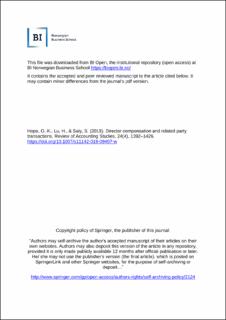| dc.contributor.author | Hope, Ole-Kristian | |
| dc.contributor.author | Lu, Haihao | |
| dc.contributor.author | Saiy, Sasan | |
| dc.date.accessioned | 2020-06-05T12:56:04Z | |
| dc.date.available | 2020-06-05T12:56:04Z | |
| dc.date.created | 2019-08-26T11:25:14Z | |
| dc.date.issued | 2019 | |
| dc.identifier.citation | Review of Accounting Studies. 2019, 24 (4), 1392–1426, | en_US |
| dc.identifier.issn | 1380-6653 | |
| dc.identifier.uri | https://hdl.handle.net/11250/2657028 | |
| dc.description.abstract | This paper examines whether independent directors’ compensation is associated with related party transactions. We focus both on directors’ total compensation and their equity-based compensation. Employing hand-collected data for S&P 1500 firms, we find that independent directors’ compensation is significantly associated with related party transactions. Specifically, we find that the level of compensation is positively related to these transactions, but we do not find equity-based compensation to be associated with them. Next, we decompose the compensation measures into “market” (i.e., predicted) level and “excessive” components and find that the results are driven by the excessive components. This association between related party transactions and director compensation is moderated by corporate governance mechanisms, suggesting that the association between the two reflects a conflict of interest between insiders and shareholders. | en_US |
| dc.language.iso | eng | en_US |
| dc.publisher | Springer | en_US |
| dc.title | Director compensation and related party transactions | en_US |
| dc.type | Journal article | en_US |
| dc.type | Peer reviewed | en_US |
| dc.description.version | acceptedVersion | en_US |
| dc.source.pagenumber | 1392–1426 | en_US |
| dc.source.volume | 24 | en_US |
| dc.source.journal | Review of accounting studies | en_US |
| dc.source.issue | 14 | en_US |
| dc.identifier.doi | 10.1007/s11142-019-09497-w | |
| dc.identifier.cristin | 1718659 | |
| cristin.ispublished | true | |
| cristin.fulltext | postprint | |
| cristin.qualitycode | 2 | |
